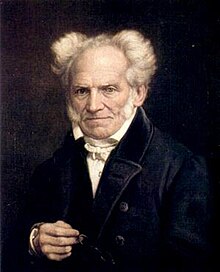Arthur Schopenhauer


Si Arthur Schopenhauer (22 Pebrero 1788 – 21 Setyembre 1860) ay isang pilosopong Aleman na kilala sa kanyang aklat na Die Welt als Wille und Vorstellung(Ang Daigdig bilang Kalooban at Representasyon) kung saan ay inangkin niyang ang daigdig ay pinapatakbo ng isang patuloy na hindi nasasapatang kalooban na patuloy na naghahanap ng satispaksiyon. Siya ay naimpluwensiyahan ng pananaw na Silanganin at kanyang inahayag na "ang katotohanan ay nakilala ng mga pantas ng India".[3] Ang kanyang mga solusyon sa pagdurusa ay katulad ng mga taga-isip na Vedantiko at Budista (i.e. asetisismo) at ang kanyang pananampalataya sa "transendental na idealidad" [4] ay nagtulak sa kanyang tumanggap sa ateismo[5][6][7][8] at nag-aral mula sa pilospiyang Kristiyano.[9][10][11]
Sa edad na 25, kanyang inilimbag ang kanyang doktoral na disertasyong Über die vierfache Wurzel des Satzes vom zureichenden Grunde(Tungkol sa Makaapat na Ugat ng Prinsipyo ng Sapat na Katwiran) kung saan ay siniyasat niya ang apat na mga natatanging aspeto[12] ng karanasan sa phenomenal na daigdig. Dahil dito, siya ay naging maimpluwensiya (influential) sa kasaysayan ng phenomenolohiya. Siya ay nakaimpluwensiya sa isang mahabang talaan ng mga taga-isip kabilang si Friedrich Nietzsche,[13] Richard Wagner, Ludwig Wittgenstein, Erwin Schrödinger, Albert Einstein,[14] Sigmund Freud, Otto Rank, Carl Jung, Joseph Campbell, Leo Tolstoy, Thomas Mann, at Jorge Luis Borges.
Mga sanggunian
[baguhin | baguhin ang wikitext]- ↑ Whether or not Schopenhauer's system is idealist has been a matter of dispute among historians of philosophy; see German Idealism on the Internet Encyclopedia of Philosophy.
- ↑ "John Gray: Forget everything you know — Profiles, People". London: The Independent. 2002-09-03. Inarkibo mula sa ang orihinal noong 2010-04-09. Nakuha noong 2010-03-12.
{{cite news}}: Unknown parameter|deadurl=ignored (|url-status=suggested) (tulong)CS1 maint: date auto-translated (link) - ↑ Arthur Schopenhauer, The World as Will and Representation, Vol. 1, trans. E. Payne, (New York: Dover Publishing Inc., 1969), 3.
- ↑ Arthur Schopenhauer, The World as Will and Representation, Vol. 1, trans. E. Payne, (New York: Dover Publishing Inc., 1969), 4.
- ↑ David A. Leeming, Kathryn Madden, Stanton Marlan, pat. (2009). Encyclopedia of Psychology and Religion, Volume 2. Springer. p. 824. ISBN 9780387718019.
A more accurate statement might be that for a German – rather than a French or British writer of that time – Schopenhauer was an honest and open atheist.
{{cite book}}:|access-date=requires|url=(tulong)CS1 maint: date auto-translated (link) CS1 maint: multiple names: mga patnugot (link) - ↑ Raymond B. Marcin (2006). In Search of Schopenhauer's Cat: Arthur Schopenhauer's Quantum-Mystical Theory of Justice. CUA Press. p. 122. ISBN 9780813214306. Nakuha noong 2 Setyembre 2012.
It is easy to find many of the underpinnings of Schopenhauer's doctrine of the denial of the will to live in the Theologia Germanica, but only if one is willing to gainsay the anonymous author's theism and Schopenhauer's atheism.
{{cite book}}: CS1 maint: date auto-translated (link) - ↑ Dale Jacquette, pat. (2007). Schopenhauer, Philosophy and the Arts. Cambridge University Press. p. 22. ISBN 9780521044066.
For Kant, the mathematical sublime, as seen for example in the starry heavens, suggests to imagination the infinite, which in turn leads by subtle turns of contemplation to the concept of God. Schopenhauer's atheism will have none of this, and he rightly observes that despite adopting Kant's distinction between the dynamical and mathematical sublime, his theory of the sublime, making reference to the struggles and sufferings of struggles and sufferings of Will, is unlike Kant's.
{{cite book}}:|access-date=requires|url=(tulong)CS1 maint: date auto-translated (link) - ↑ B. R. Hergenhahn (2008). An Introduction to the History of Psychology. Cengage Learning. p. 216. ISBN 9780495506218.
Although Schopenhauer was an atheist, he re-alized that his philosophy of denial had been part of several great religions; for example, Christianity, Hinduism, and Buddhism.
{{cite book}}:|access-date=requires|url=(tulong)CS1 maint: date auto-translated (link) - ↑ Arthur Schopenhauer, The World as Will and Representation, Vol. 2, trans. E. Payne, (New York: Dover Publishing Inc., 1966), 639. "the Veda says; Finditur nodus cordis, dissolvuntur omnes dubitationes, ejusque opera evanescunt. In agreement with this view, the fifteenth sermon of Meister Eckhart will be found well worth reading."
- ↑ Arthur Schopenhauer, The World as Will and Representation, Vol. 2, trans. E. Payne, (New York: Dover Publishing Inc., 1966), 635. "Even the conclusion of Seneca's last letter is in keeping with this... which certainly seems to indicate an influence of Christianity."
- ↑ The World as Will and Representation, Vol. 2, Ch. 48 (Dover page 616), "The ascetic tendency is certainly unmistakable in genuine and original Christianity, as it was developed in the writings of the Church Fathers from the kernel of the New Testament"
- ↑ Arthur Schopenhauer, The World as Will and Representation, Vol. 1, trans. E. Payne, (New York: Dover Publishing Inc., 1969), table of contents.
- ↑ Addressed in: Cate, Curtis. Friedrich Nietzsche. Chapter 7.
- ↑ Albert Einstein in Mein Glaubensbekenntnis Naka-arkibo 2022-03-11 sa Wayback Machine. (Agosto 1932): "I do not believe in free will. Schopenhauer's words: 'Man can do what he wants, but he cannot will what he wants,[Der Mensch kann wohl tun, was er will, aber er kann nicht wollen, was er will]' accompany me in all situations throughout my life and reconcile me with the actions of others, even if they are rather painful to me. This awareness of the lack of free will keeps me from taking myself and my fellow men too seriously as acting and deciding individuals, and from losing my temper." Schopenhauer's clearer, actual words were: "You can do what you will, but in any given moment of your life you can will only one definite thing and absolutely nothing other than that one thing." [Du kannst tun was du willst: aber du kannst in jedem gegebenen Augenblick deines Lebens nur ein Bestimmtes wollen und schlechterdings nichts anderes als dieses eine.] On the Freedom of the Will, Ch. II.

